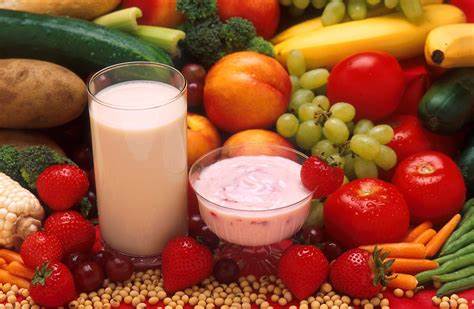Before, during, and after cancer treatment, it is essential to maintain proper nutrition. Many people lose their appetite and energy as a result of radiation therapy and chemotherapy medicines, increasing the risk for cancer cachexia/malnutrition. Chemotherapy can put a lot of stress on the body and increase the body's nutritional demands. It is essential to maintain a balanced diet and drink nourishing fluids daily. During this period, the main goal should be to maintain a healthy weight and eat nutritious meals that provide calories and nutrients for energy, repair, recovery, and healing. Plenty of fresh colourful vegetables and fruit, moderate amounts of whole grains, and plant protein sources like nuts, beans, lentils, tofu, and tempeh, as well as small servings of fish, poultry, lean meats, and nonfat or low-fat dairy foods, make up a healthy eating pattern.

A well-balanced diet aids your body's efficiency. If you have cancer, this is much more critical. A balanced diet can also help to prevent the breakdown of bodily tissue and promote the growth of new tissues. Eating healthily can help cope with medication side effects. It may also help to tolerate greater dosages of certain medications. Indeed, certain cancer therapies are more effective in patients who are well-nourished and consume adequate calories and protein.
Diet tips before the start of chemotherapy
A balanced diet will help in improving overall health and stamina even before the start of chemotherapy.
- Lean meats like turkey, chicken, and fish will be quite beneficial in ensuring adequate protein intake. Consuming plant-based foods rich in protein such as tofu, soybeans, tempeh, edamame, beans, lentils, nuts, seeds, whole grains like quinoa and amaranth, oats, sprouted beans, and lentils are very beneficial.
- Processed meats and red meats such as ham, hot dogs, and sausages should be avoided.
- Light meals may be made using whole grains, particularly oats, quinoa, amaranth, and brown rice.
- Eat a variety of colourful fruits like berries, melons, grapes, apples, bananas, and green vegetables including broccoli, spinach, kale, etc.
- Avocado, almonds, flaxseeds, and fatty fish all offer the body much-needed fats.
- Before chemotherapy, drinking enough water helps the body operate properly and avoids constipation.

What to eat before going for chemotherapy?
On the day of chemotherapy it is best to go for light, bland foods such as plain yoghurt or yoghurt with fruits and nuts, fresh fruit salad, poached egg with toast, oatmeal, bone broth, or miso soup, low-acid fruit juices
like apple, and grapes. Ensure proper hydration. Drink water every half an hour or as tolerated.
Diet tips during chemotherapy:
The goal of your diet should be to manage Chemo's side effects while also maintaining your stamina. Baked chicken, potatoes, and cooked veggies are excellent sources of protein and provide a well-balanced meal. Eggs assist in retaining muscle mass, repair tissues and boost the immune system by providing enough low-fat diet sources. Drinking enough water helps to prevent diarrhoea or vomiting, as well as constipation, tiredness, and dry mouth, all of which are common side effects of chemotherapy. Some foods that are a must in diet during
chemotherapy are listed below :
- Oatmeal is high in nutrients and palatable if you're suffering from chemo side effects like dry mouth, mouth sores, or nausea. Its fibre will also help in maintaining regular bowel movements.
- Avocados contain healthy fats and dietary fibre. It will help to keep you full and provide the necessary calories.
- Eggs are an excellent source of both protein and fats. Protein will help in maintaining muscle mass and fats will provide energy. Consider consuming eggs to fight fatigue.
- The broth is a great alternative to water and will help maintain the electrolyte balance in the body.
- Nuts are packed with nutrition and provide a good amount of proteins, healthy fats, and micronutrients.
- Pumpkin seeds are anti-inflammatory. They contain antioxidants, proteins, and healthy fats. They are a great healthy snacking option.
- Cruciferous vegetables like broccoli, cauliflower, cabbage, and kale are packed with nutritional properties. They contain a good amount of vitamin C. They have anti-inflammatory compounds. They contain sulforaphane, a compound that helps improve brain function.
- Fresh fruits and vegetable smoothies. If you're having trouble digesting solid meals or obtaining enough nutrients in your diet, homemade smoothies are a fantastic choice. They're customizable, enabling you to select the ideal components for your symptoms or taste preferences.
- Fish. Omega-3 fatty acids and vitamin D are abundant in fish. Also, consuming protein- and fat-rich meals, such as omega-3-rich fish, can help avoid undesired weight loss, and vitamin D is essential for immunity.

Diet post-chemotherapy
- After the chemotherapy is completed, concentrate more on eating a well-balanced and nutritious diet :
- Fruits, vegetables, and whole grains include antioxidants that aid in early healing and protect cells from chemo-induced damage. Reduce your sugar intake and eat more vegetables. Due to trouble swallowing, stick to soft bland meals and liquids. Include low-acid fresh fruit juices in your diet. It will replenish the body.
- Eat small and frequent 5 to 6 meals throughout the day.
- To deal with nausea, eat cold food like yogurt, and ice-creams.
- Keep your water intake high.
Personalized Nutritional Care for Cancer Patients
For personalized guidance on cancer treatments and complementary therapies, consult our experts at ZenOnco.io or call +91 9930709000


